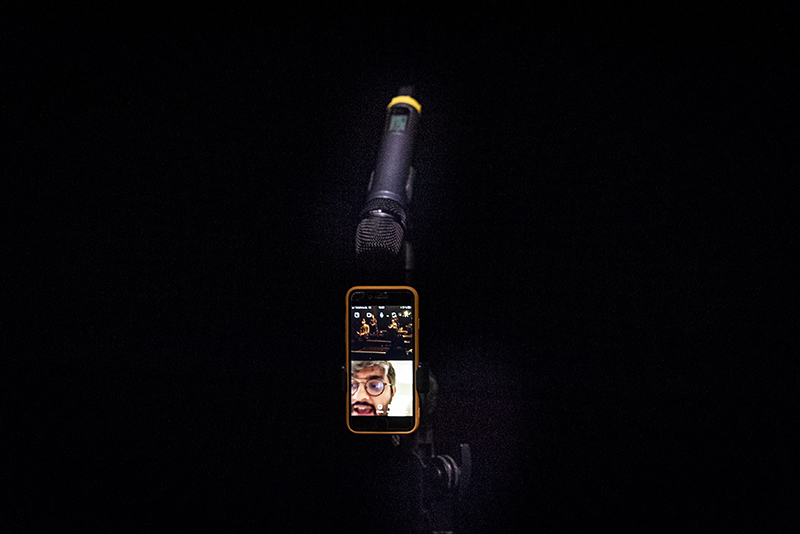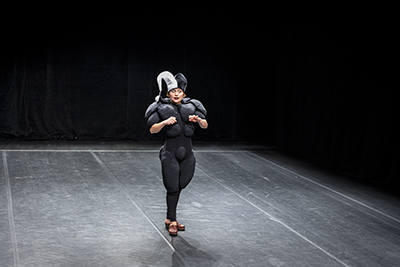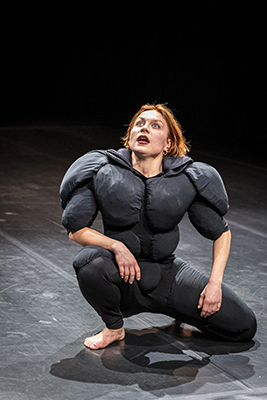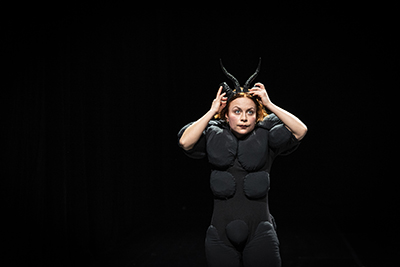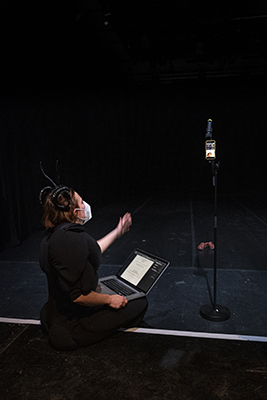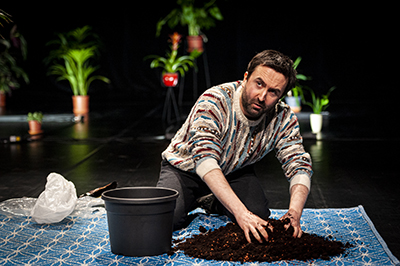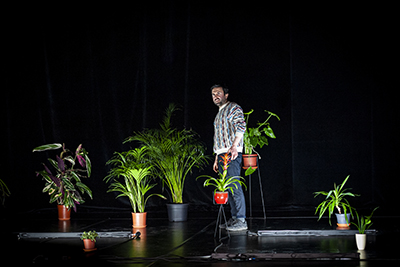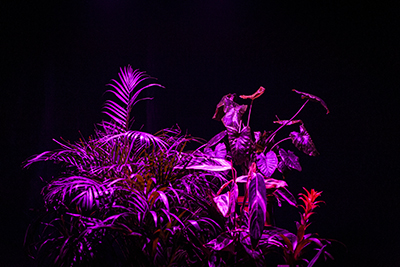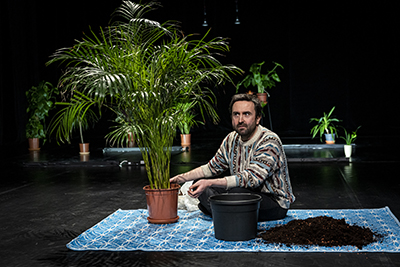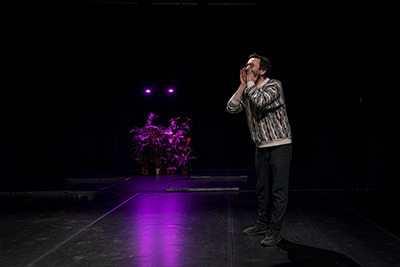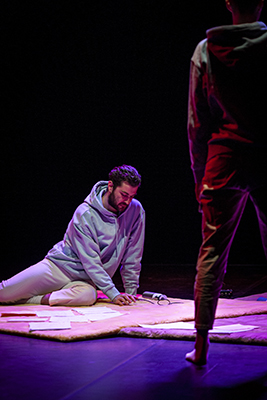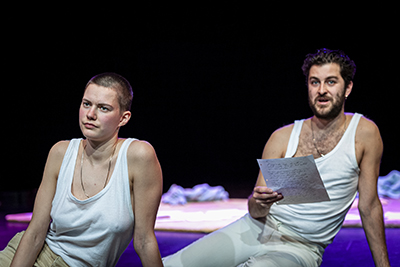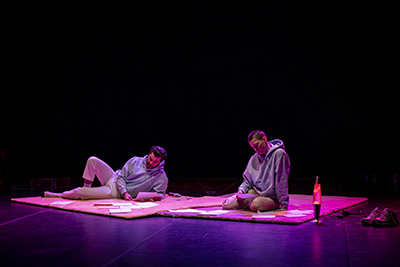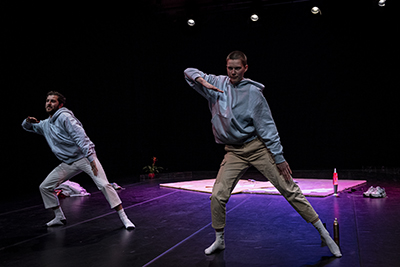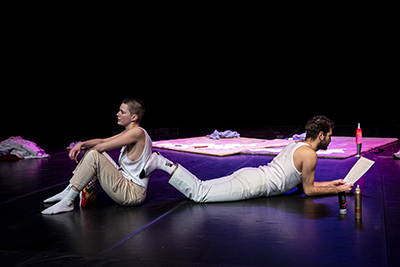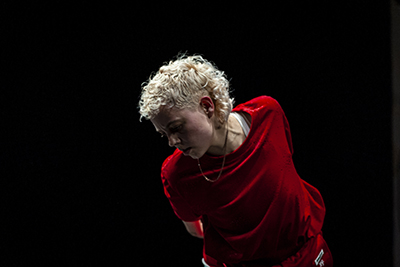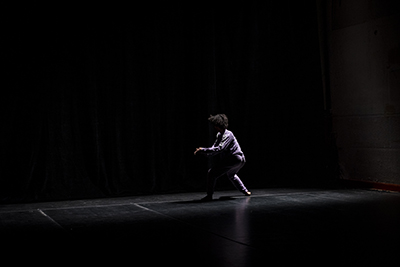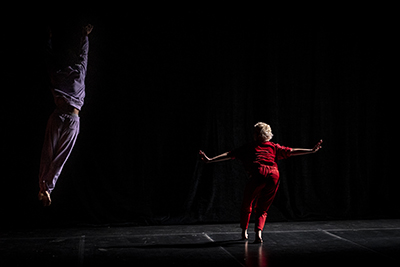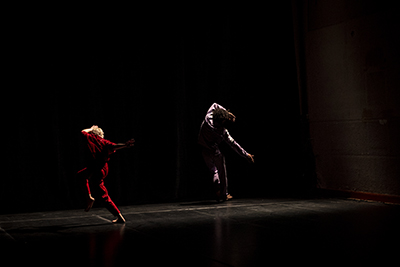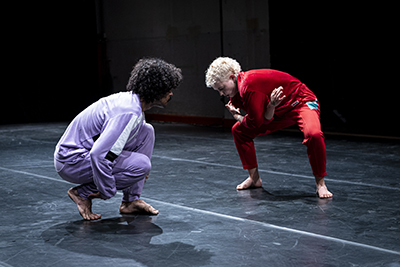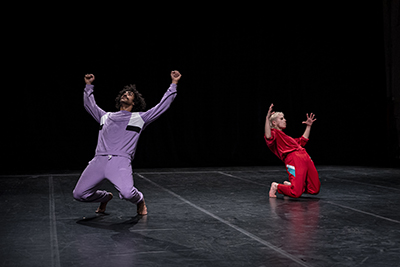Romantic Comedy
Louise Trueheart
"I hate that I don’t hate you, not even close, not even a little bit, not even at all."" This iconic line from the movie "10 Things I Hate About You" was written on a personalized raisin and wine-flavored chocolate heart, which was placed on my seat at Ballhaus Ost as a welcome gift to the Dirty Debüt performance series. The theme was “romantic comedy” and I was the only person in the “audience” who was not a performer, curator, or part of the technical team. I wore...
Romantic Comedy
Louise Trueheart
I hate that I don’t hate you, not even close, not even a little bit, not even at all.
This iconic line from the movie 10 Things I Hate About You was written on a personalized raisin and wine-flavored chocolate heart, which was placed on my seat at Ballhaus Ost as a welcome gift to the Dirty Debüt performance series. The theme was “romantic comedy” and I was the only person in the “audience” who was not a performer, curator, or part of the technical team. I wore a nice blazer because I hadn’t been to the theater in a year.
On first thought, I wasn’t sure what artists were going to do with the theme “romantic comedy.” Romcoms are a genre of film that welcomes the viewer to identify with the situation, casts actors for their relatability, and ultimately is intended to temper the loneliness and harshness of life and love. Romantic comedies take the edge off, not by being smart or good quality, but by being comfortable and caring.
In that sense, and in the sheer awesomeness of being in a real theater watching real people on stage experience real pleasure at performing for real, in front of a real audience, we all felt less lonely. Both love, and the hilarity that theater has become in a global pandemic, were the modus operandi in a way the raisin-and-wine chocolates barely expresses. Everybody wanted to make this night special.
The first piece was by Liina Magnea, who sings like an angel and does a great gremlin impression. She was wearing a black unitard that had cartoonish muscle-shaped cushions sewn onto it. Her shoes were clogs. Liina asks questions that are important in the industry, like “why am I not famous yet?” and, “what am I doing with all this talent?” As if trying to answer, or perhaps as a way to affirm her love of performing, she sang a song composed of love songs in four languages (Finnish, Icelandic, German, and English). She sang it a capella and it looked effortless – she is a real ham – but the bit must have taken hours of rehearsal. Liina’s skills as a performer are ablaze, and are contextualized by the (fictional?) premise that she wants to take over the world in her career as a pop and performance icon. Her collaborator, Abhinit Khanna, interrupted the show with a video call, and as Liina wedged the phone into a conveniently placed stand within range of a microphone, Abi spoke about the exhibition he was planning in his living room in New Delhi. The comedy was that he wouldn’t get off the phone, and Liina wouldn’t kick him off either. A shady parallel emerged: the exhibition was Abhi’s pretense to laying out his world domination scheme, which he did as one would plan a dinner party. The romance of the piece was not between them, nor was it romantic in the sexual sense of the word. The relationship was love-hate, and it was between Emerging Artists and Aspiration.
Sometimes the hardest thing to admit is desire. It’s easier to lament the ways you are bad at love, how you look for love in all the wrong places, or how nobody likes you. Romuald Krężel, however, is brave. He brought all ten of his plants to the stage, crediting each of them in the program, and began the piece by having a conversation with a flourishing Majesty Palm. Eyes full of feeling, he described how much he loves observing the plant, how he thinks the fronds resemble slim fingers, or like hair growing up. He asked the plant how many leaves it has and reported that the plant said it had 80. He warned it that it might feel uncomfortable with what was about to happen, and then brought out a larger pot, fresh soil, and drainage stones. As he dealt with transferring the living thing to fresh rich ground, he told a story that stars a dog we all wished was onstage – Redko. Redko, “like all Labradors, is enthusiastic and positive about any kind of human interaction.” Redko accompanied Romuald through the week in Warsaw it took the artist to come out to himself. Each day, he sat in the apartment and drank volumes of vodka. Each day, he cradled Redko’s loving head in his hands, weeping, and cried out “am I gay??” Redko’s invisibility is as alive as the Greek chorus of potted plants, in this tale of self-discovery.
Onur Ağbaba made a work featuring letters of love, rejection, and heartbreak. The texts are written by middle-schoolers, as is made clear by lines like, “I thought I loved you on Friday but today I realized that I don’t love you,” and “I would give you another chance but I don’t think I could ever love you so why try?” and “my favorite boyfriend is Phillip. My second favorite boyfriend was Mark, and my third favorite is Johannes.” Onur and his collaborator Lotta Beckers performed a flawless Britney choreography and hung out in matching hoodies, in poses that felt defiantly attractive. The set looked the way I wanted my bedroom to look when I was 13: there was a lava lamp. The show notes said the piece was about realizing they were queer. To me, it was less a description of a turning point and more of a habitation of a moment in time, when love letters were written on paper, and self-confidence was hard to come by, but queer alliances, although secret, were strong as wrought iron.
Eternal Betrayal, by Am Ertl, was about heartbreak, and the physicality of this event. Against resolution and moving on with your life, the feet of the piece were firmly planted in that moment. Feelings, feelings, feelings: escape is an illusion. Am and Renan Alves Manhães wore monochromatic red and lavender outfits. The piece had no set, and the curtains were drawn – it was empty, raw, and rough, like my heart when you left me. They fell into postures that depict emotions like shock, surprise, sadness, and desperation. Think: back of the hand to the forehead, arms reaching yet grasping nothing, crumbling onto bended knee as eyes plead to heaven, all this wrapped in smooth transitions and undergirded by a punchy rhythm that caught my breath. The dancer’s emotional facial expressions highlighted the dance without overshadowing it. Indeed, it would be difficult to overshadow such precise and engaging physicality. The investment in movement that draws the audience in was plain to see, and it was working. I wish I was more used to watching dance like this. There was no speaking, and although I thought the movement beckoned it, catharsis is hard to come by without words. I wonder if part of the heartbreak, the bitter betrayal, is in the dancer’s relationship to dance and its limitations. Or maybe dancing heartbreak is enough, and I am just being emotionally avoidant. Regardless, it seemed to me that love is required to expose dance, basically un-adorned, in the way they did.
After the show, during a legally-sized and masked gathering with champagne and cigarettes, someone said that this is how it always should be – this feels the same as a ‘real show.’ In my opinion, it couldn’t have felt more different. “Normally” there are less shits given. From the chocolates and their individual handwritten quotes strait out of Buzzfeed’s 25 best lines from romantic comedies, to all 12 audience members clapping long enough for each performer to bow twice, this theater experience warmed our hearts. It made me cherish the theater and our love/hate relationship. On some nights I feel rejected and abandoned, left to scream-cry “All By Myself” in my pajamas, glass of red wine in one hand and rolled up magazine in the other. On other nights I feel cradled in theater’s warm embrace; it’s safe, it’s hot, and I feel like I was born to be exactly here. We’ve been apart for a year. We don’t know whether things are going to work out. But when I sat, all dressed up, in that warm dark room and the lights came up, the theater looked at me seriously and said, “I wrote you 365 letters. I wrote you every day for a year” and I am sitting there, thinking to myself, “you wrote me??!?” and then the theater said, “it wasn’t over for me. It still isn’t over!”
